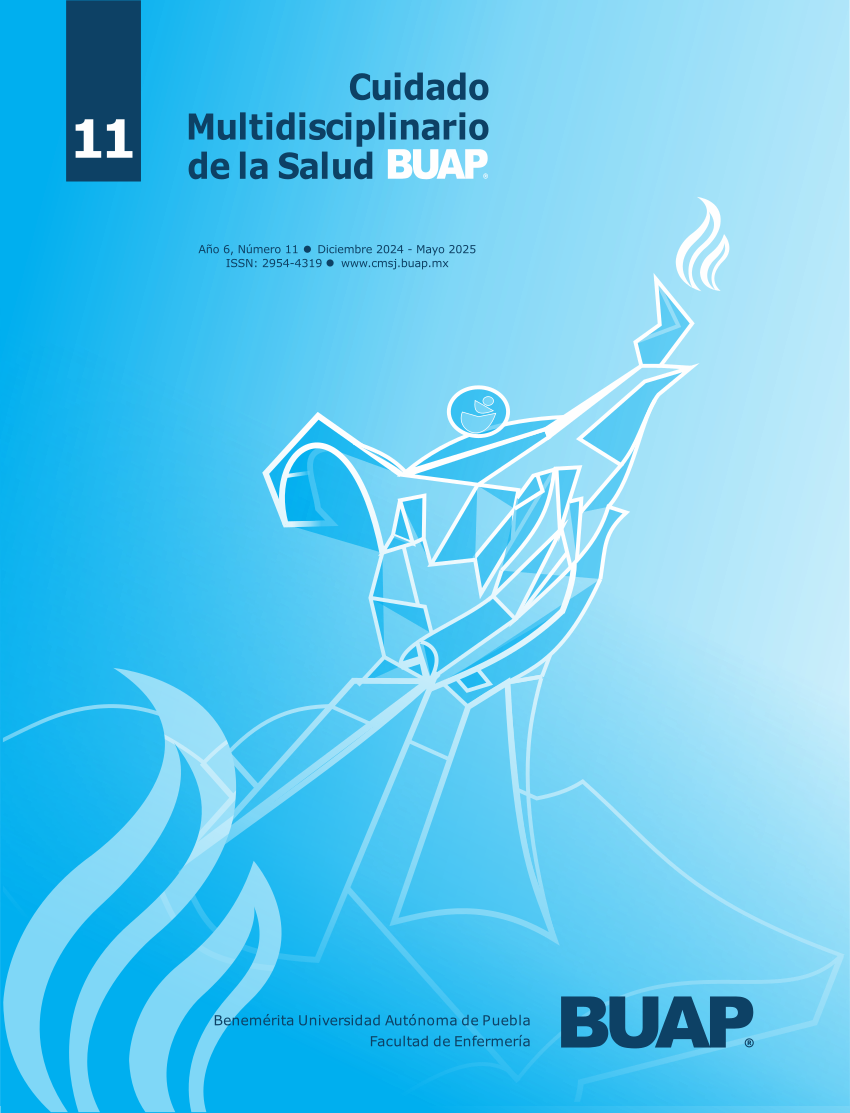Emotional Intelligence asociation and Academic Performance in nursing students
Keywords:
Emotional Intelligence, Academic Performance, Students, NursingAbstract
Introduction. Emotional Intelligence asses people ability to rate and express emotions accurately.
Objective. To describe the association between Emotional Intelligence and Academic Performance in nursing students from a public university in Mexico.
Methodology. Cross-sectional descriptive study. 174 nursing students were considered, both sex; non-probability sampling. It was applied the self-report of Emotional Intelligence TMMS-24 with 24 items and three dimensions that asses clarity of feelings, emotional attention and emotional repair. It has Likert scale questions with 5 options; .90 of reliability coefficient. Data was processed in SPSS v. 25 obtaining prevalence. Chi square test was made in order to evaluate Emotional Intelligence with academic performance.
Results. 90% of the participants were women, the age of 20 to 22 prevailed, 32% of the participants studies and have a job. The dimension of emotional attention, it was acceptable for 46% of women and 53% of men; meanwhile in clarity of feelings it was acceptable for 40% of women and 47% of men; in emotional repair it was acceptable for the 51% of women and 35% of men. 58% has an average grades of 7 and 8 at the moment. Chi square test does not show significant data.
Conclusions. There is no link between Emotional Intelligence and Academic Performance. More than 40% of the students need to improve aspects related with the three studied factors.
References
Alvi, T., Nadakuditi, RL., Alotaibi, TH., Aisha, A., Ahmad, MS., & Ahmad, S. (2023). Emotional intelligence and academic performance among medical students - a correlational study. European Review for Medical and Pharmacological Sciences, 27, 1230–1237. https://www.europeanreview.org/wp/wp-content/uploads/1230-1237.pdf
Arntz Vera, J., & Trunce Morales, S. (2019). Inteligencia emocional y rendimiento académico en estudiantes universitarios de nutrición. Investigación En Educación Médica, 8(31), 82–91. https://doi.org/10.22201/facmed.20075057e.2019.31.18130
Barrera-Gálvez, R., Solano-Pérez, C. T., Arias-Rico, J., Jaramillo-Morales, OA., & Jiménez-Sánchez, RC. (2019). La inteligencia emocional en estudiantes universitarios. Educación y Salud, 14, 50–55. https://doi.org/https://doi.org/10.29057/icsa.v7i14.4437
Bisquerra, R. (2021). Universo de emociones. (PalauGea Comunicación SL, Ed.). Ediciones Compartir.
Bisquerra R. & Mateo J. Competencias emocionales para un cambio de paradigma en educación. Sf. Horsori.
Bonilla-Yucailla, D., Balseca-Acosta, A., Cárdenas-Pérez, M. J., & Moya-Ramírez, D. (2022). Inteligencia emocional, compromiso y autoeficacia académica. Análisis de mediación en universitarios ecuatorianos. Interdisciplinaria, 39(2), 249–264. https://doi.org/10.16888/interd.2022.39.2.16
Cámara de Diputados del H. Congreso de la Unión. (2014). Reglamento de la Ley General de Salud en materia de investigación para la salud. https://www.diputados.gob.mx/LeyesBiblio/regley/Reg_LGS_MIS.pdf
Espinoza-Venegas, M., Sanhueza-Alvarado, O., Ramírez-Elizondo, N., & Sáez-Carrillo, K. (2015). A validation of the construct and reliability of an emotional intelligence scale applied to nursing students. Revista Latino-Americana de Enfermagem, 23(1), 139–147. https://doi.org/10.1590/0104-1169.3498.2535
Fernández-Berrocal, P., Extremera, N., & Ramos, N. (2004). Escala para la evaluación de la expresión, manejo y reconocimiento de emociones. . https://psicologiaveracruz.wordpress.com/wp- content/uploads/2016/02/trait-meta-mood-scale-tmms-24.pdf
Fernández Berrocal, P., & Extremera Pachecho, N. (2005). La inteligencia emocional y la educación de las emociones desde el modelo de Mayer y Salovey. Revista Interuniversitaria de Formación de Profesorado, 19(3), 63–93. https://www.redalyc.org/pdf/274/27411927005.pdf
Gobierno de México. (2015, April 23). Programa Construye T. Acciones y Programas. https://www.gob.mx/sep/acciones-y-programas/programa-construye-t-4598
Hernández-Sampieri, R., & Mendoza Torres, C. P. (2018). Metodología de la investigación (Mc Graw Hill Education, Ed.).
Idrogo Zamora, D. I., & Asenjo-Alarcón, J. A. (2021). Relación entre inteligencia emocional y rendimiento académico en estudiantes universitarios peruanos. Revista Investigación de Psicología, 26, 69–79. https://doi.org/10.53287/ryfs1548js42x
Lamas, H. (2015). Sobre el rendimiento escolar. Propósitos y Representaciones, 3(1), 313–386. https://doi.org/http://dx.doi.org/10.20511/pyr2015.v3n1.74
Mestre, J. M., Guil, R., Brackett, M. A., & Salovey, P. (2008). Inteligencia Emocional: Definición, evaluación y aplicaciones desde el Modelo de habilidades de Mayer y Salovey.
Mikulic, I. M., Crespi, M., & Caballero, R. (2018). Construcción de un inventario de inteligencia emocional percibida para adultos. Ciencias Psicológicas, 12(1), 121–136. https://doi.org/10.22235/cp.v12i1.1602
Ministerio de Educación, F. profesional y deportes. (2007). Educación Emocional. Contenidos. https://www.educacionfpydeportes.gob.es/portada.html
Morillo-Guerrero, I. J. (2022). Inteligencia emocional y rendimiento académico: Un enfoque correlacional. RECIE. Revista Caribeña de Investigación Educativa, 6(1), 73–90. https://doi.org/10.32541/recie.2022.v6i1.pp73-90
Petrides, K. V., & Furnham, A. (2001). Trait emotional intelligence: Psychometric investigation with reference to established trait taxonomies. European Journal of Personality, 15(6), 425–448. https://doi.org/10.1002/per.416
Salovey, P., Stroud, L., Woolery, A. y Epel, E. (2002) Perceived emotional intelligence, stress reactivity, and symptom reports: Further explorations using the trait meta-mood scale» Psychology and Health, pp. 611-627. Citado por Barrera-Gálvez, R., Solano-Pérez, C. T.,
Arias-Rico, J., Jaramillo-Morales, OA., & Jiménez-Sánchez, RC. (2019). La inteligencia emocional en estudiantes universitarios. Educación y Salud, 14, 50–55. https://doi.org/https://doi.org/10.29057/icsa.v7i14.4437
Sánchez Núñez, M. T., Fernández-Berrocal, P., Montañés Rodríguez, J., & Latorre Postigo, J. M. (2008). ¿Es la inteligencia emocional una cuestión de género? Socialización de las competencias emocionales en hombres y mujeres y sus implicaciones. Electronic Journal of Research in Educational Psychology, 6(2), 455–474.
Supervía, U., & Bordás, S. (n.d.). El rendimiento escolar, la inteligencia emocional y el engagement académico en adolescentes. In Electronic Journal of Research in Educational Psychology (Vol. 17, Issue 1). Retrieved June 10, 2024, from https://acortar.link/olYKKw
Universidad Autónoma de Querétaro. (2024). Coordinación de Información y Estadística. Estadísticas. https://planeacion.uaq.mx/uii/index.php/estadisticas
Usán Supervía., P., & Salavera Bordás, C. (2018). Motivación escolar, inteligencia emocional y rendimiento académico en estudiantes de educación secundaria obligatoria. Actualidades En Psicología, 32(125), 95–112. https://doi.org/10.15517/ap.v32i125.32123
Vargas Valencia, Á. R., Vega-Hernández, M. C., Aguila Sánchez, J. C., Vázquez Espinoza, J. A., & Hilerio López, Á. G. (2022). Self-Perceived Emotional Intelligence Levels in Nursing Students in Times of a Pandemic: Multivariate Representation. International Journal of Environmental Research and Public Health, 19(3), 2–13. https://doi.org/10.3390/ijerph19031811
Wang, K., Li, Y., Zhang, T., & Luo, J. (2022). The Relationship among College Students’ Physical Exercise, Self-Efficacy, Emotional Intelligence, and Subjective Well-Being. International Journal of Environmental Research and Public Health, 19(18), 1–14. https://doi.org/10.3390/ijerph191811596
Downloads
Published
How to Cite
Issue
Section
License
Copyright (c) 2024 The moral rights belong to the author, the economic rights belong to the Benemérita Universidad Autónoma de Puebla.

This work is licensed under a Creative Commons Attribution-NonCommercial-NoDerivatives 4.0 International License.
The moral rights belong to the author, the economic rights belong to the Benemérita Universidad Autónoma de Puebla.






